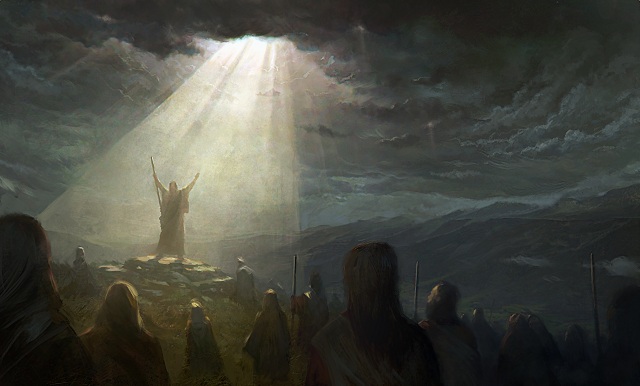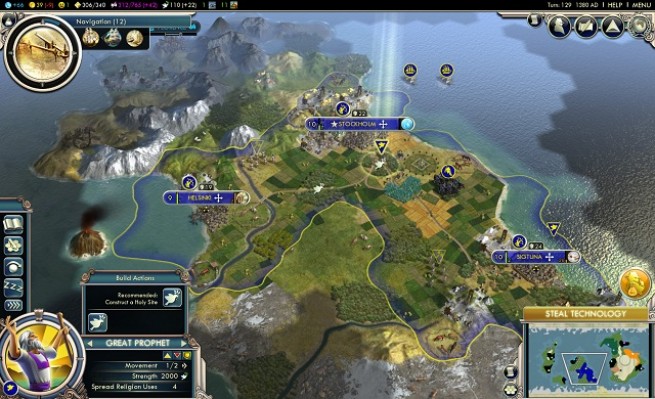Falling out with a game series is a difficult process, especially so when you’ve already stuck through the good and the bad of past entries. But Maryland developer Firaxis’ newest expansion for the PC strategy game Civilization V, subtitled Gods and Kings, is proving to test my resolve to hold off on that final goodbye.
Looking back now on the time I’ve spent with the original release, I suspect I was going through the usual stages of grief. Denial: “No, Rob. It’s really not that bad. Look at the graphics! The pretty unit animations!” Anger: “Seriously, computer A.I.? You’re going to place that weak, ranged archer next to my powerful swordsman? You’re not even trying!” Bargaining: “OK. I’ll just play on Immortal, the second highest difficulty. I never do that, but this should finally make for a good match.” Depression: “End turn…end turn…end turn….” Acceptance: “It’s not what it looks like, Civ V. I swear, Civ IV and I are just friends.”
I wanted Gods and Kings to make up for the fundamental issues with Civ V. I wanted to believe that the A.I. would know how to play the hex-based, tactical wargame portion. I wanted to believe that Firaxis could fix the inherent flaws in using a global happiness measure as a meaningful limit to empire growth.
But I’m left sitting with a night full of disappointment despite a few highlight moments here or there.
WHAT YOU’LL LIKE
Civ V is finally a builder’s game
Many times when I approach a new Civ adventure, I just want to plunk down in some corner of the world and erect impressive structures of culture and significance that last the ages. Warring with rival nations can be a stressful affair that I’d prefer to avoid if possible. And if you choose an archipelago map type (because the A.I. still doesn’t seem to quite understand the importance of naval power), you’ll be left alone enough to build to your heart’s content.
Here’s where Firaxis actually fixed something important. The unusually long construction times in the initial release of Civ V meant that most of the buildings were useless. Taking 25 or 30 turns to place a Granary in a city for the extra food just wasn’t worth the effort when you’d do much better with a Colosseum for the happiness boost or a University for the additional beakers to push up your research rate for discovering new technology.
Firaxis has adjusted the pace of production (measured in hammers) of your empire so that it scales with tech progress appropriately, which was a major issue with the original Civ V release. Previously, you could accumulate beakers at such a pace that you’d advance well past new discoveries before you ever had a chance to build what you’d researched. Now, my large cities finally feel like the industrious metropolises I always imagined them to be.
Espionage makes diplomacy better
Civ V brings back Civ III-styled surveillance, which eschews fiddling with actual spy units and lets you get on with your secret missions from a dedicated menu screen. There, you can plant undercover agents within enemy cities, and they will gather intelligence about your rivals.
The spy’s primary function is to steal technology from other nations, but he also might discover nasty plots brewing within the halls of government of your neighbors. In one game, agent Col Ceathar revealed that an Iroquois attack party was en route to the borders of Carthage, led by my pal Dido. Clicking the pop-up notification took me directly to a diplomacy screen with Dido, where I had the opportunity to warn her of the pending assault. In other instance, the friendly Austrians warned me that Wu Zetian, leader of the Chinese, had her eyes on my lands. The way that espionage is woven into diplomacy makes for some exciting turns of events when you least expect.
The new religion mechanic plays into this as well. In another game, I decided to use my many, idle great prophets to spread Tengriism, the native belief system for my Celtic empire. After converting several cities in Japan, leader Oda Nobunaga asked for my audience to give me an ultimatum: Stop spreading Tengriism or face the consequences. Although we were prior allies, Japan and I were now on the brink of full-scale war.
Diplomacy is also less opaque than in the original Civ V. In another spat with Oda Nobunaga, he notified me that he had bullied a city-state that I had pledged to protect. I could make the incident a problem between us or let it go. The most interesting thing about this exchange was the fact that a pop-up detailing the exact effects — a hit to diplomatic relations or a loss of influence over the city-state — appeared when I moused over my options.


